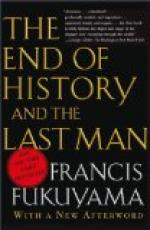|
This section contains 1,396 words (approx. 5 pages at 300 words per page) |

|
SOURCE: “The Theory That May Be History,” in Los Angeles Times Book Review, January 19, 1992, pp. 2, 7.
In the following review, Mead offers tempered assessment of The End of History and the Last Man, which he describes as “a book of murkily vast ambitions and limited successes.”
“The End of History?” was the provocative title of an essay published in the summer 1989 issue of The National Interest. It was written by Francis Fukuyama, then the deputy director of the State Department's Policy Planning Staff. The article made the point that, with the collapse of communism, there were no worldwide ideological rivals to western style democracy as a form of government. History, said Fukuyama following the German philosopher G. W. F. Hegel, is at bottom the story of ideological struggles between opposing ways of life. Feudalism, fascism, and communism: they had all fought democracy and they had all lost. Democracy had...
|
This section contains 1,396 words (approx. 5 pages at 300 words per page) |

|


